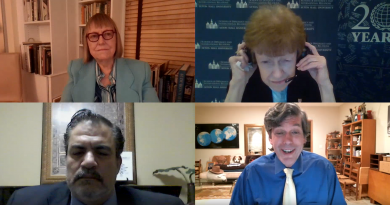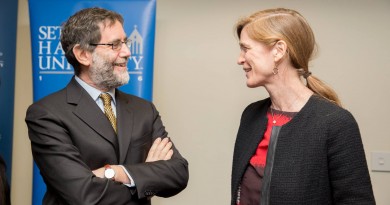An Interview with the President of the Dr. Martin Luther King Jr. Scholarship Association
Dia Bolton
President of the Dr. Martin Luther King Jr. Scholarship Association
Tell me a bit more about your organization and its mission.
In 1969, the Dr. Martin Luther King Jr. Scholarship Association was established at Seton Hall University to increase minority enrollment through regular admissions. This was the result of the efforts of a dedicated and impassioned coalition of students campaigning for the need for full financial assistance for minority students in order to give them the opportunity to attend a college/university. The scholarship was awarded to ten African American scholars. This was the first substantial attempt to ensure more diversity and appreciation for other cultures within Seton Hall’s campus. These distinguished scholars would have to prove themselves by maintaining a 3.0 cumulative G.P.A. for their four years at Seton Hall University. In 1974, the scholars decided amongst themselves to complete 20 hours of community service per semester and host various programs on and off campus in remembrance and in reverence of Dr. King. All scholars had to act in a manner becoming of a scholar since they held the name of Rev. Dr. Martin Luther King, Jr., a man whose philosophy was one of justice and love. Failure to fulfill any of these requirements was decided by the scholars to end in probation and/ or termination of a student’s scholarship. The student scholars were mandated to hold the name of Dr. King in the highest possible regard, for it was and is the message of Dr. King that is the conscience of this country and the salvation for the world. Thus it is the mission of MLKSA scholars to be academically excellent and socially responsible. MLKSA Scholars are to educate themselves in the life, times and philosophy of Dr. King. As student leaders, they are to first attain the tools of leadership, compassion, and morality so that they may encourage and foster the ideals of Dr. King to those around them. It is the mission of MLKSA Scholars to be studious, to know everything necessary in order to make Dr. King’s dream of social, political, and economic justice a living reality. As MLKSA scholars we must be champions of good will in every area and aspect of their lives. It is the mission of MLKSA to encourage and foster active participation in the Seton Hall University community on matters pertinent to King’s life, legacy, and mission. MLKSA Scholars must actively participate in the lives and realities of those in their communities, both Seton Hall and the places we call home. It is the duty of MLKSA to educate our brethren in the legacy that was Dr. King’s and the importance of his word today. It is the mission of each scholar to treat one another as family and to love one another in the manner Dr. King spoke of so that they carry the honor of being an MLKSA Scholar wherever they go, both now and for years to come.
What is your role in your organization?
As president of the Martin Luther King Scholarship Association, I am responsible for maintaining the mission, credibility, and good standing of the Association. Being that we are a community service / activist-based organization, a primary part of my job is to maintain those core values and develop new ways to satisfy those values in this day and age.
Have recent events, such as the nationwide protests against police brutality and systemic racism, changed your perspective on the problems we face as a nation?
These recent events have not changed my views on systemic racism and police brutality. It has always been there, now camera phones are catching it on video and allowing it to be accessible for all to see.
As a member of the Black Caucus, what efforts have been made to address Seton Hall’s response to recent events?
As an appointee within the Black Caucus, I was able to help aid the Black Caucus in drafting a letter to the school addressing each concern we have with Seton Hall University as a whole when it came to systemic racism within the education system, curriculum, etc. By doing so, we have been able to work with administration to get these concerns addressed. I hope next generations will get to enjoy the perks of our works now, instead of having to repeat the discussion we continue to have on these topics.
What can we do to promote racial equity both on and off campus?
I feel as if education is the most important thing. Spreading education in rooms that many marginalized individuals are still not allowed access in to, even in 2020. Discussing systemic racism within the health fields, education fields, etc. There is so much work to do, but I feel like education is where we should start.
What would you say that we, as young people and students, can do keep the movement going and bring lasting change?
I honestly find that question difficulty to answer. If watching black women and men get killed by police constantly on the news and your social media outlets isn’t enough to continue the movement, I do not know what is!
What would you say is the most important thing that people trying to be allies should know and do?
I feel that allies should understand that they should be vocal. Agreeing with me behind closed doors does not help me. As an ally, I do not believe there is such thing as getting burnt out or overwhelmed from supporting me. Individuals like me wake up everyday with this skin color, gender, etc., so if we can remain powerful in our image even with the disrespect that comes towards us, your allyship should be unwavering.
-This interview was conducted by Editor-in-Chief, Jarrett Dang, on behalf of the Editorial Board.



